THE VOLUNTEERS, Chapter 2, "The Wooded Knoll" (Part 2 of 2) 
[Gamenote: That’s a heavily updated version of the full southern half of the map of initial Fed / Confed positions Sunday morning, according to what my character can see or learned about later. I would show the game map from here, but it has more information than my character ought to know (such as what the Confed brigades at the rightward fords have been doing, and where Beauregard is.) It’s kind of distressing that by this time, only 20 minutes after the computer started moving troops around at all, Union forces have already pushed far down past the Henry House where Jackson made his historical stand! But my character doesn’t know about any of that, remember.]
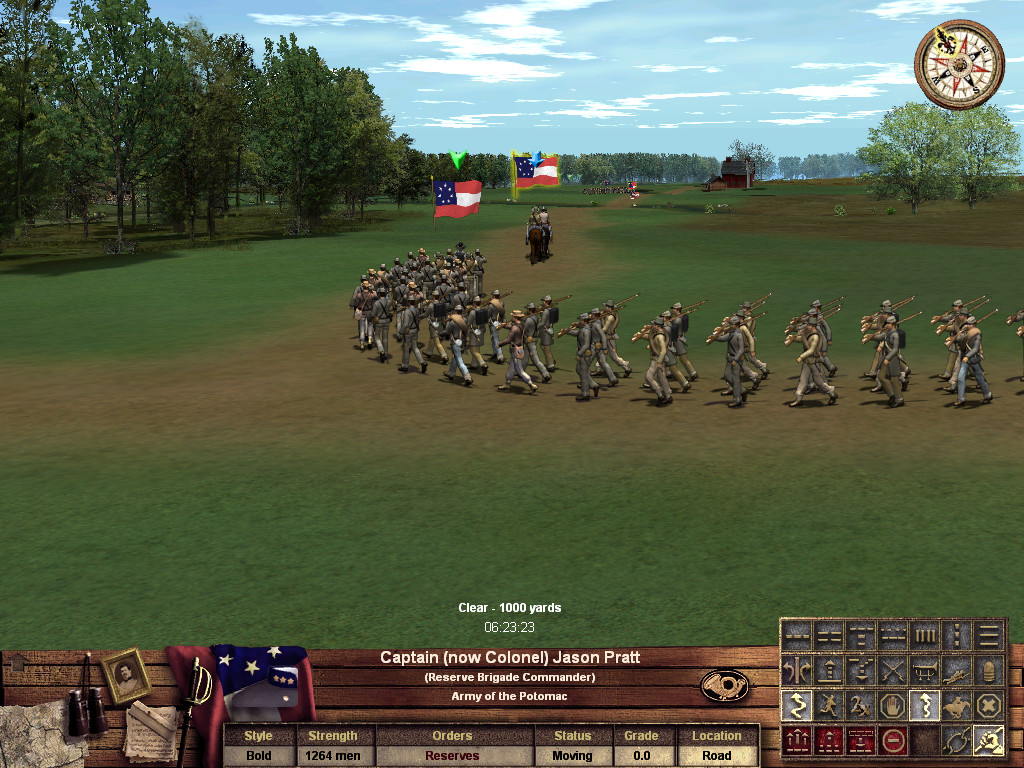
Along the way back east, we passed the odd site of the 8th Louisiana regiment just standing north of the road. They didn’t look like they were in reserve for anyone, and I didn’t rank high enough to bring them along. I guessed they had been left behind without orders when the artillery caravan turned north off the road. To me they seemed to be nervously watching for whatever north of here their cousins in that other regiment were fleeing from.
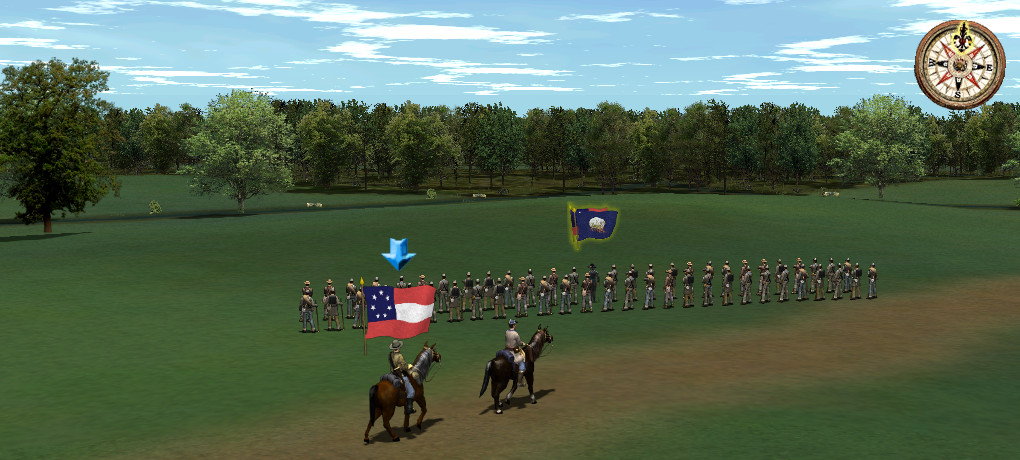
A little before 6:30 we took a rest in front of the Smith Farm house, as servants brought us water from the nearby irrigation creek.
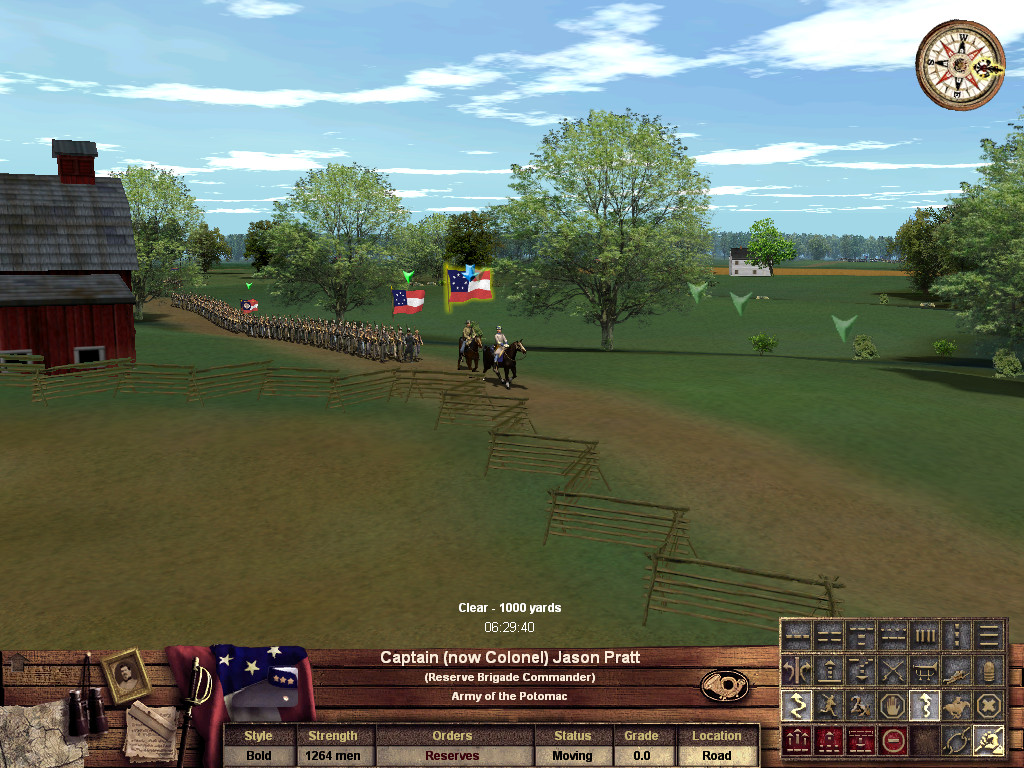
That was when we first heard the guns.
The farmhands jumped more than we did. We had been on the receiving end of large naval guns recently, and had trained with powder in line for a couple of weeks. But still. Somewhere north of here, regiments were fighting in anger.
We could see regiments off in the distance, across Bull Run and other farmland, and we could barely make out they were allies, but not what they were doing.
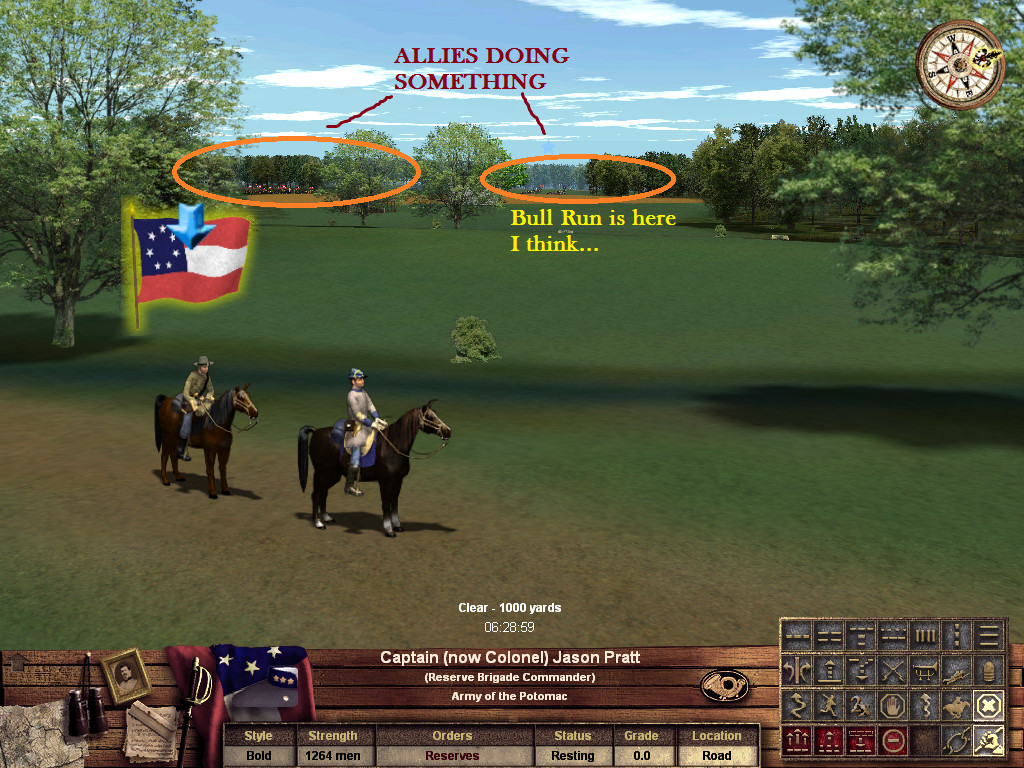
After a rest we continued on back east to the fords.
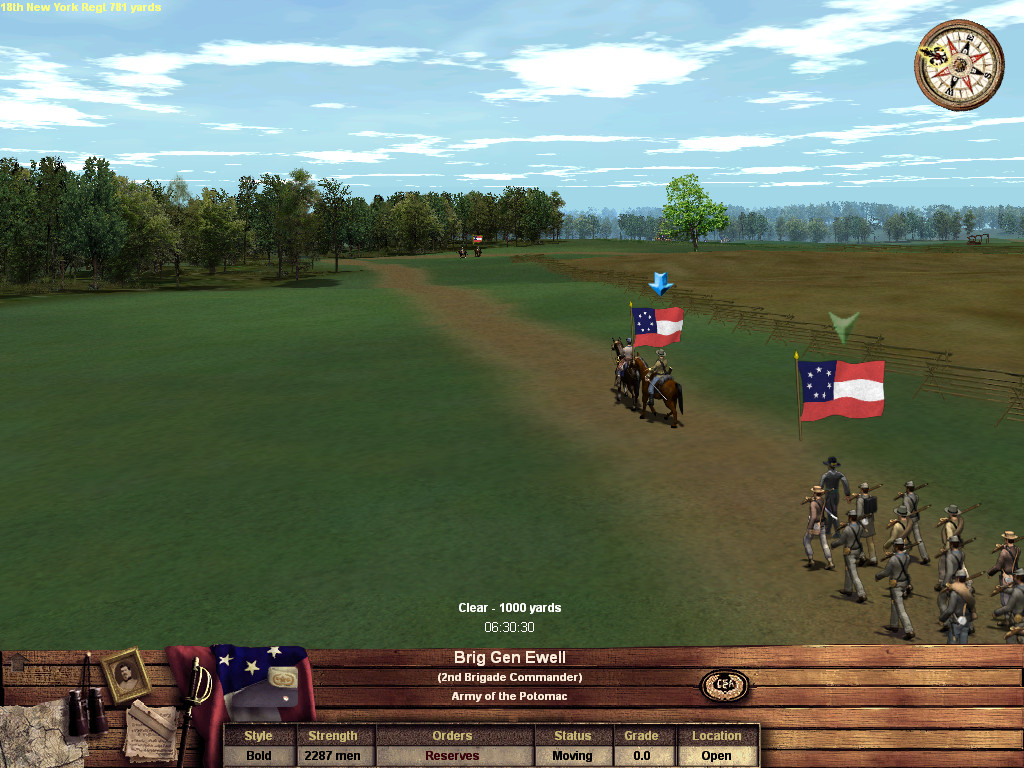
Soon we could see a general ahead of us: Ewell, by his flag and my spyglass. He was riding, by himself (and his aide), to Mitchell’s ford.
“That,” I muttered to everyone in particular, “does not bode well.”
“Where’re Longstreet and the other small divisions?” Captain Grubb was holding his hand above his eyes as though that might help a little. “We’d be seeing at least two now, right?”
“Hell with that: where’s the rest of Ewell’s division!?” Captain Boyle grated.
“Well,” drawled Colonel Drake, “I’m either increasingly glad or increasingly sorry we came back this way!”
“At least he’s riding toward the north,” I shrugged. “He has to be riding toward his troops, who’ve crossed the river. With Longstreet and the others. Pressing toward Centerville. Right?” I thought I could see regiments belonging to Jones much farther ahead, still guarding their ford, too. I sent a rider back to Captain Gore, who was marching his regiment behind the Arkansians, with the peculiar news.
As we approached the fork leading from the farm to Mitchell’s ford, our Arkansas captains said they felt like the enemy must be near somewhere. That wasn’t unreasonable, since by now we were pretty sure some of the gunfire was rolling down from the woods across the ford.
“Who’s that in the trees over there!?” pointed Colonel Drake, bringing his regiment to a tense halt.
I whipped out my spyglass, and tried to steady Scorch enough to make out some details. “...just a headquarters, I’m sure! And, ummmm... oh, it’s General Beauregard!”
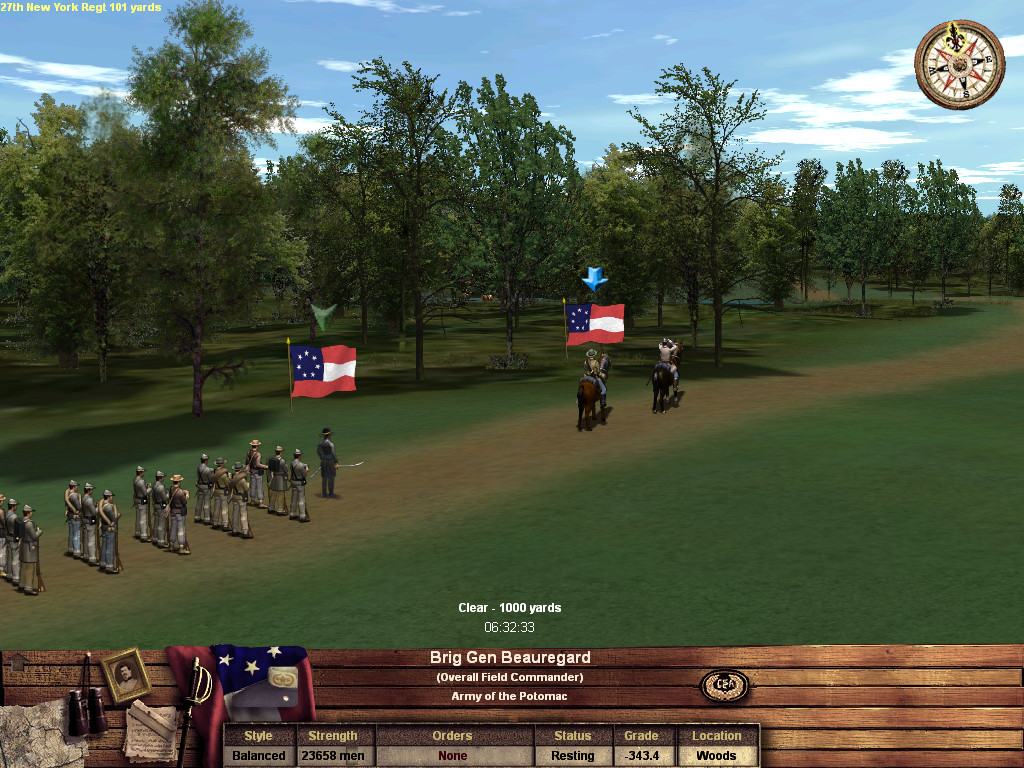
As we rounded the corner to the ford, and stopped to rest, I trotted over to get any information the general, or rather his aides, felt like giving me. Which wasn’t much, because they didn’t know much.
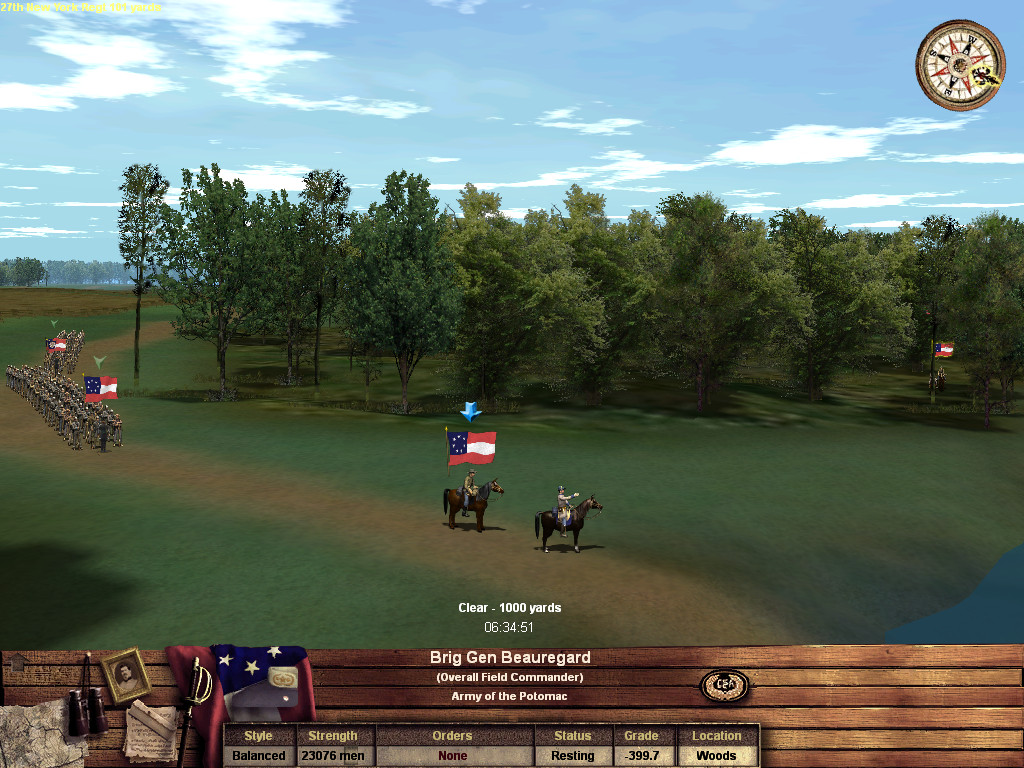
Beau didn’t know where Longstreet was. At all.
He had sent Generals Longstreet, Jones, and Bonham across their respective fords to probe for a clear march to Centerville -- Jones had crossed the river at sunrise in fact -- and General Ewell’s troops had followed when they arrived not long afterward, while Ewell stayed behind with a few regiments posted sort-of near the fords on our side. Since then, Beauregard’s headquarters had heard constant fighting, and then scattered reports that Jones had pulled his HQ back on this side of Bull Run, and that Confederate regiments were running back to this side of the river and hiding.
Our mission was to probe across the river, but not very far, find out what was going on, and send news back to General Beauregard.
“Well I’m all excited to be part of this plan!” Colonel Drake announced as I pointed out where I wanted the regiments to muster on the road once we crossed Bull Run. Soon we were knee deep in the water.
“Pee while you can, boys!” Captain Grubb sang out.
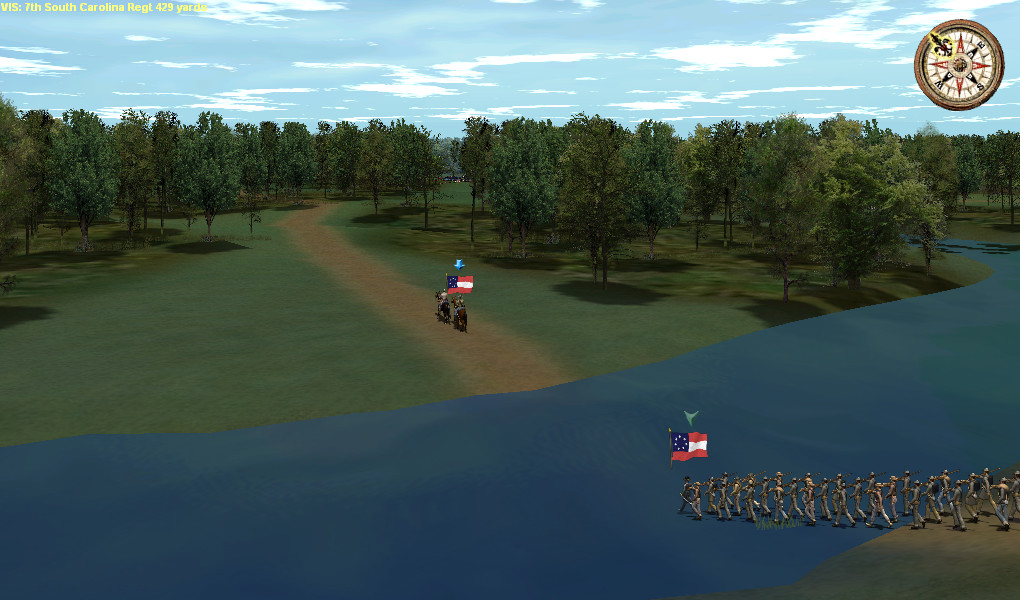
I was already across and trying to get any idea at all what was happening here. I could see a regiment or two off in the distance where the road looped around through the trees, and they seemed to be moving, but...
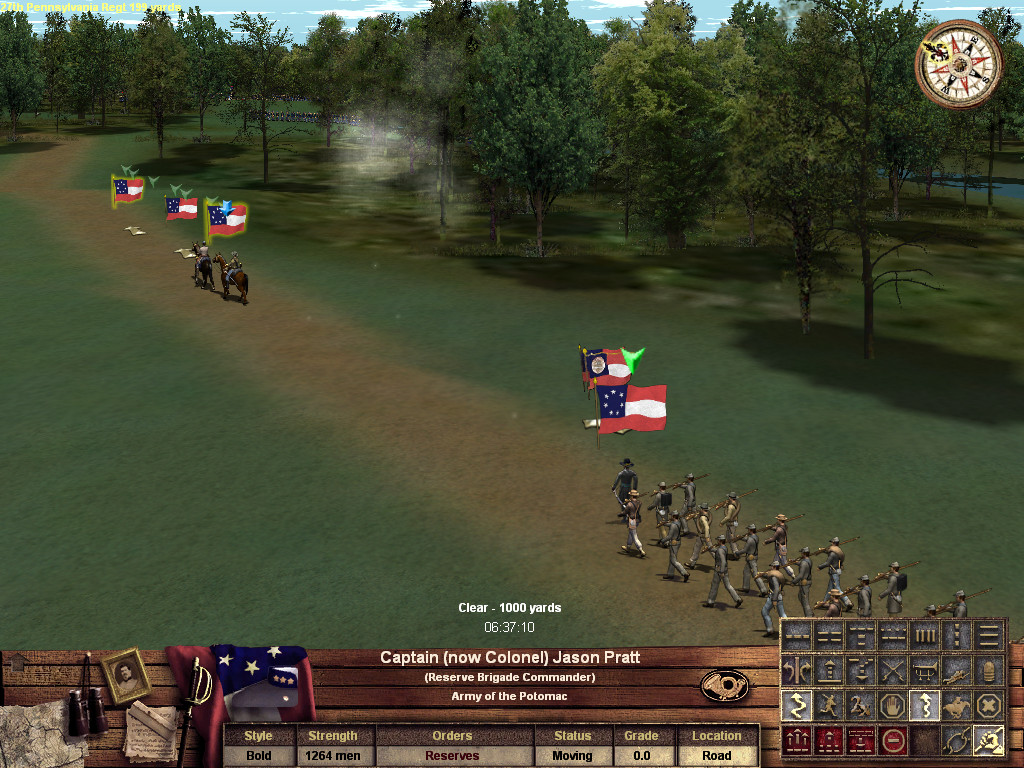
BAAAMpingypingypingy...
A cannon shell airburst over the road. Fortunately between myself and the Arkansas Vols.
“Pee while you can, boys!” Captain Gore called out behind them, as the Tennessee Vols were still down in the riverbed crossing. Captain Grubb stabbed a rude gesture in the air.
“Ohhhhh good they brought
their artillery,” Captain Boyle was muttering loudly, and Colonel Drake was calling forward, “Off the road, off the road!”
I pointed into the trees on our right, signaling for double-time.
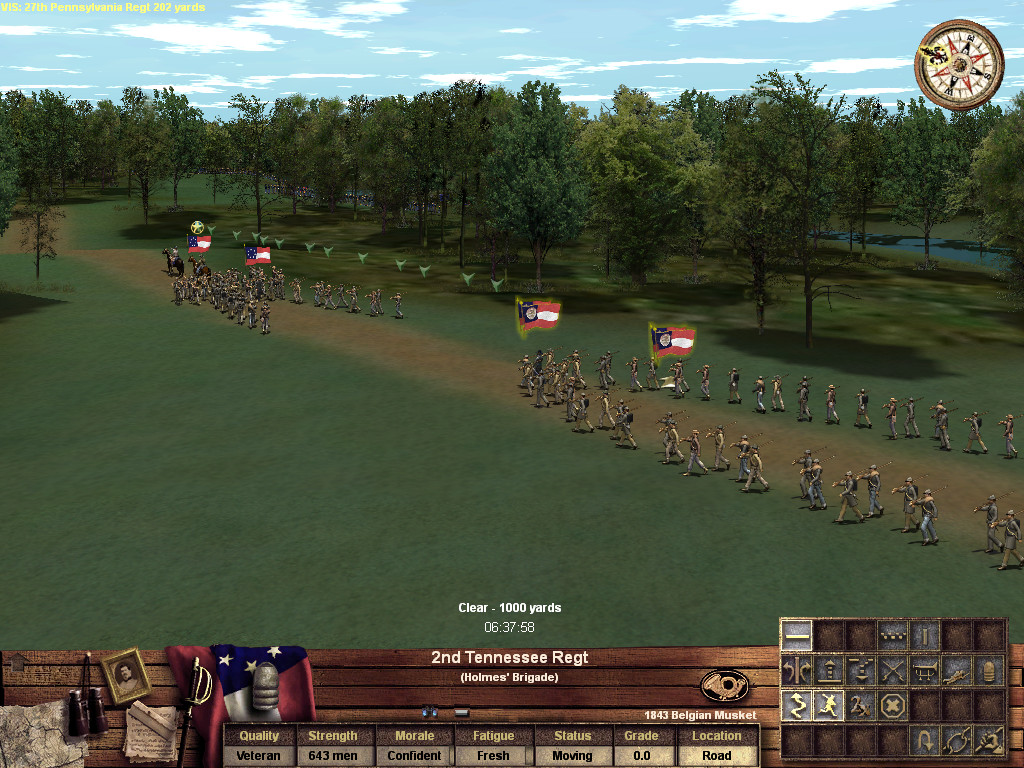
“I don’t know where those cannons are, or how they can see us, or if some sniper is just salting the road in case,” I told them as I shepherded them to safety, sort of, “but I can see Yanks marching around on the other side of these woods. So move as quietly as you can. I don’t think they know we’re here yet.”
It took a painfully long two minutes for the regiments to line up for fighting -- Captain Gore was too eager and moved too far forward, so that the lines of both Vol regiments overlapped -- and then to march into the woods. Meanwhile I could see Confederate forces behind us in the woods on the other side the road. A lot of them. Moving forward, too. Tentatively.
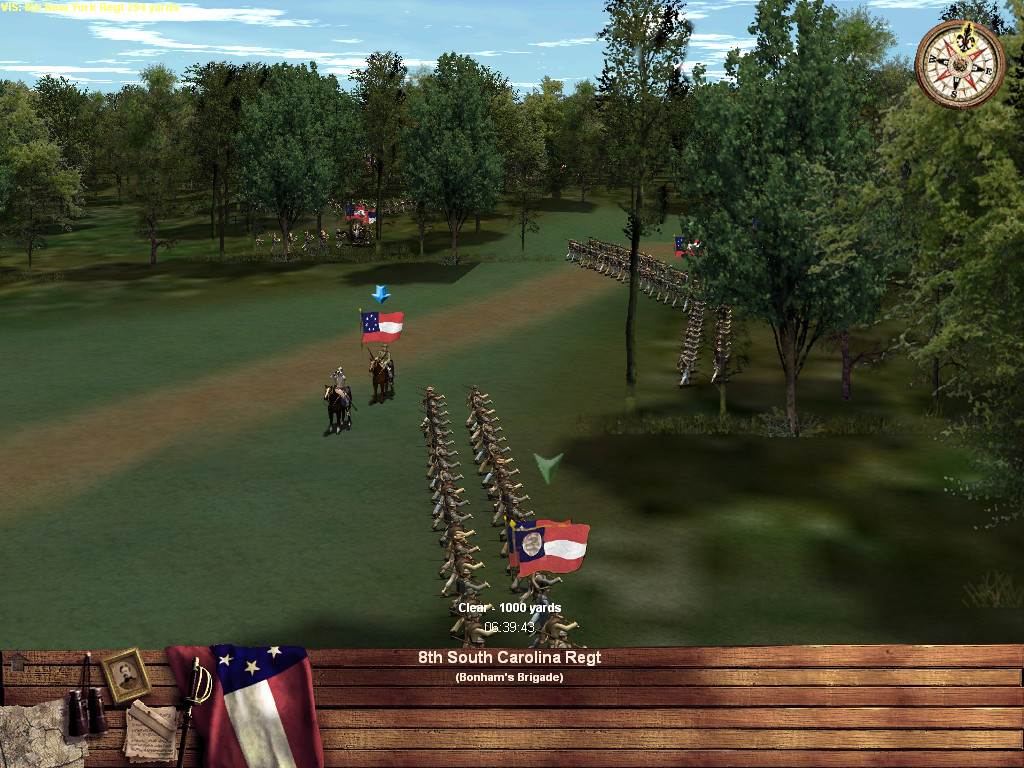
The 8th South Carolina, heavily reduced already, was closest to us; and I could see the flag of General Bonham not too much farther up that line. We had accidentally become the leading flanking edge of a divisional thrust!
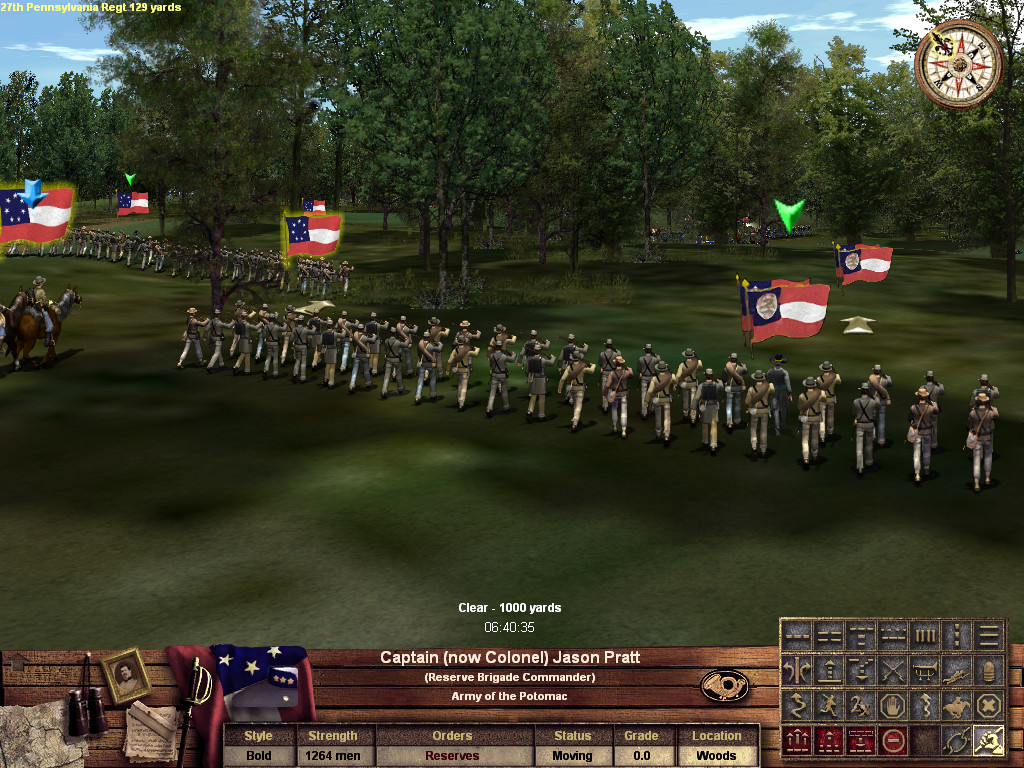
We slowly seized a wooded knoll, around which on the east and south the Bull Run river wrapped. To our east, we could now faintly start to see at least one Union division trying to work their way across the river...
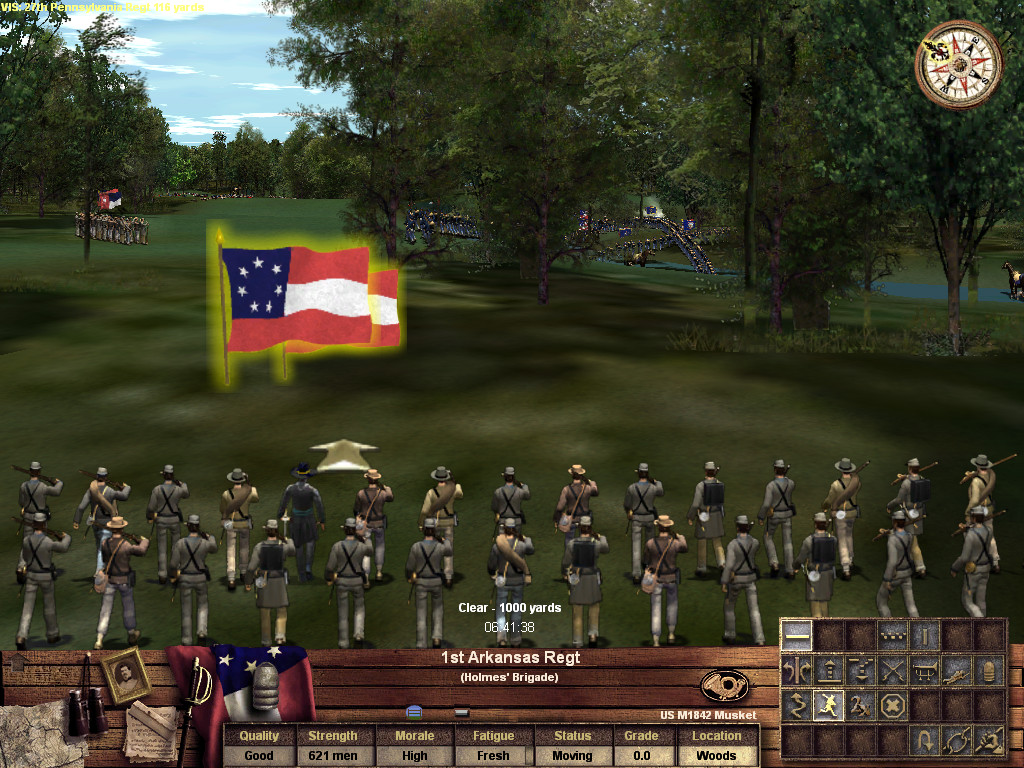
...maybe two.
I wended on Scorch through the wooded knoll as quickly back and forth between my slowly advancing regiments as I could, telling my men, “Now, someone has made a bad mistake. And someone is just about to exploit that mistake. And in case you’re wondering who’s who, well, we’ve got heavy cover and a height advantage, and we’re supporting each other. And we’re fresh for the fight.”
“Like shotgunnin’ fish in a river,” whispered Captain Boyle.
Someone among our allies had noticed our advantageous position, because soon a courier had found me!
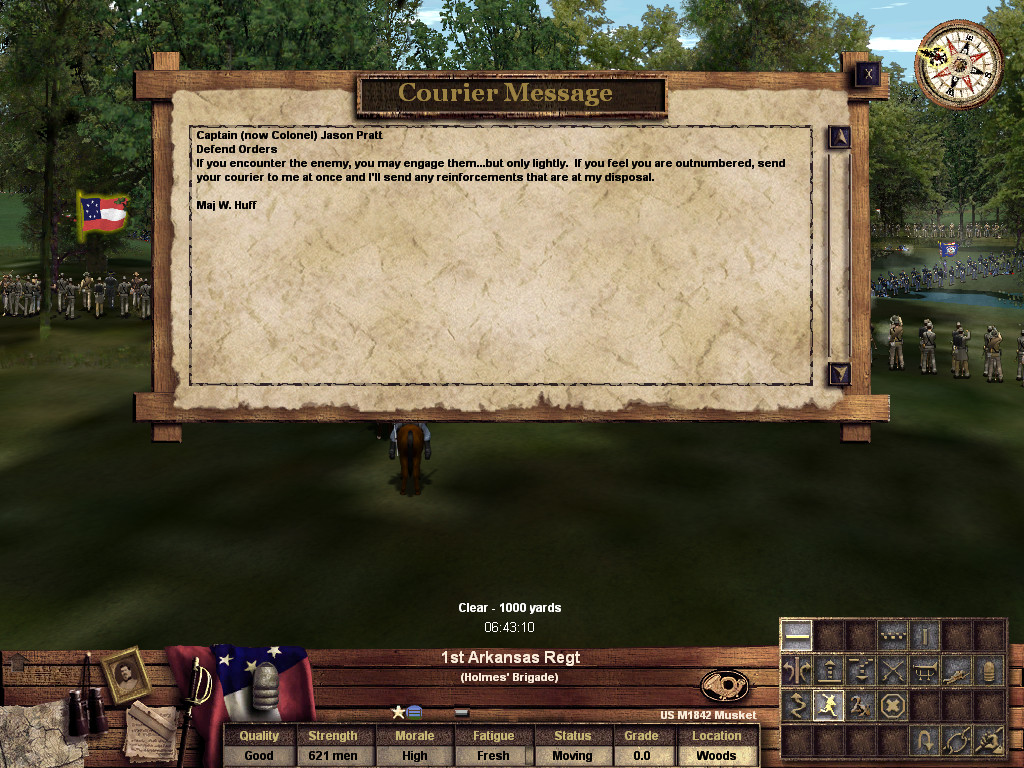
“Who’s Major Huff?” Captain Gore wanted to know.
“No idea,” I said after sending the courier on his way. “But we were gonna do this anyway, and if that was some kinda trick by the Yankees, I think they’re gonna be sorry!”
My Tennessee Volunteers happened to be the first regiment to get in range on a target, with their twenty-year-old Belgian muskets. Their accuracy, to be blunt, was terrible. But in this situation we didn’t need much accuracy.
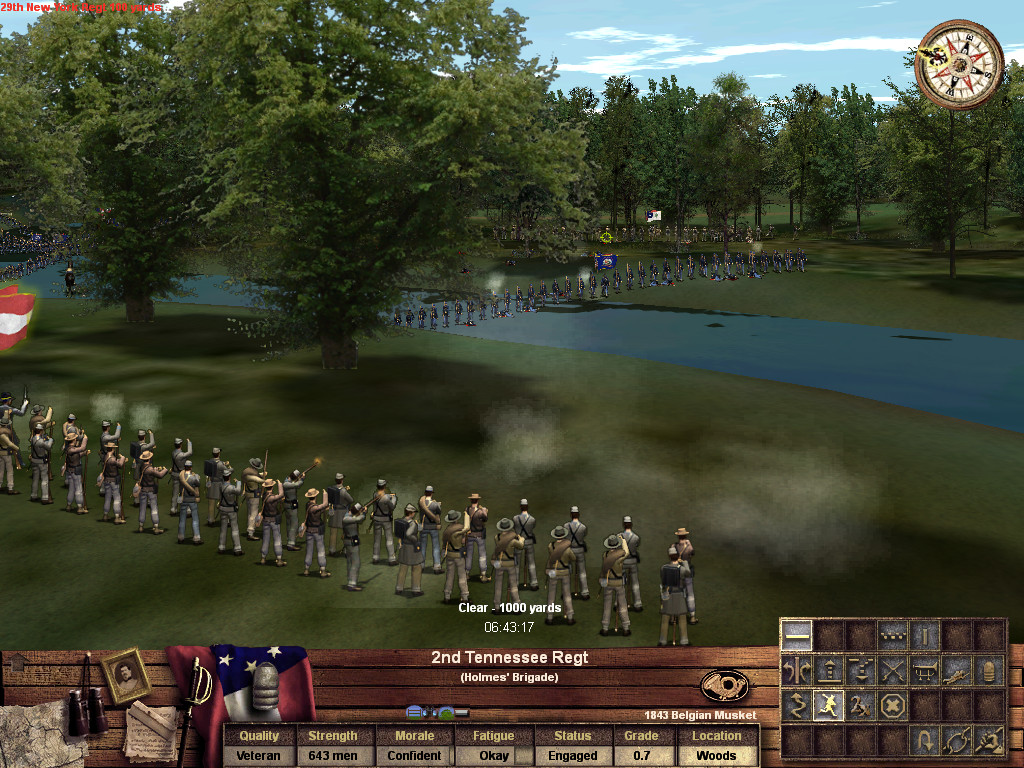
“YANKEEES!” I roared, in the echo of the very first volley fired by the 2nd Confederate Regiment of the State of Tennessee. “GOOOO
HOOOOOOOMMMME!!”
They didn’t. But it wasn’t from our lack of trying.
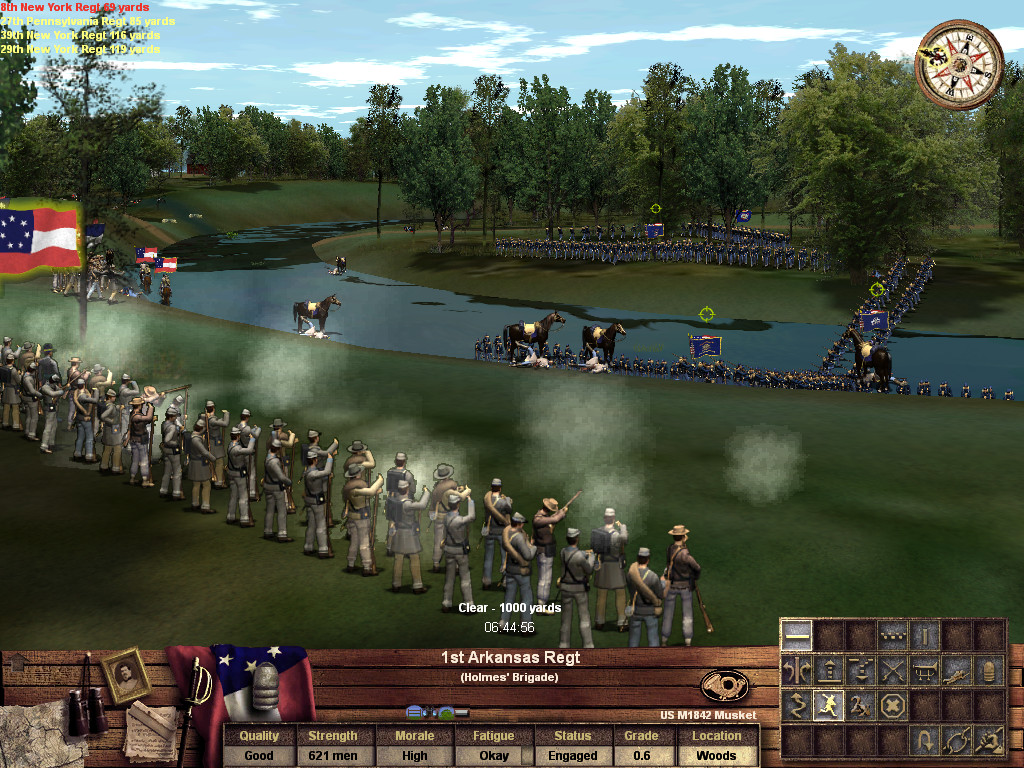
Due to a quirk in the trees, Colonel Drake and the 1st Arkansas could see farther -- and shoot farther, too, with their US 42 muskets. Still far from great weapons, but American made. No less than three divisions in their sights, as many skeet as they wanted to shoot.
Though these skeet were shooting back.
With balls that tore and shattered through a man.
Our casualties weren’t anywhere near the horror we were inflicting on those poor trapped Yankees. Only a few of our men were even injured at all. But still, I rode back and forth lending courage to each line, as they took their first casualties, feeling the blood of their friends spattering around them.
A specially sorrowful tale was told on the Union side by the numerous dead couriers, crumpled next to or under dead horses, dotting the slope leading down to the river. They had been dead when we got here; we hadn’t been the first Confederate defenders to work from this knoll. Now that I knew what to look for, I could see the blood on the leaves, the detritus left behind by regiments.
The 2nd Tennessee didn’t have quite as many enemies to shoot, but still two good full regiments tangled up below them in the running river waters, washing their blood away.
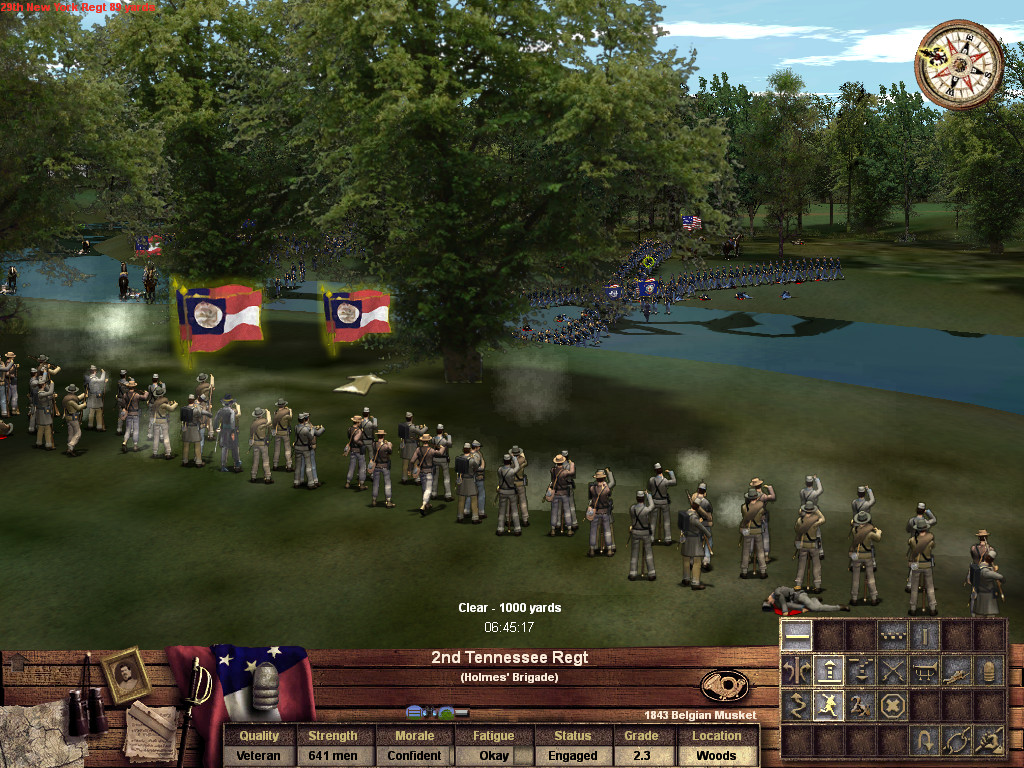
“Go home!” the Volunteers were shouting. “Go home! You ain’t even seen the beginning of it! For the love of God and your mothers, git on home!”
Time passed. Bonham’s brigade began pushing more panicking New Yorkers into the river, to replace the ones we were chewing up.
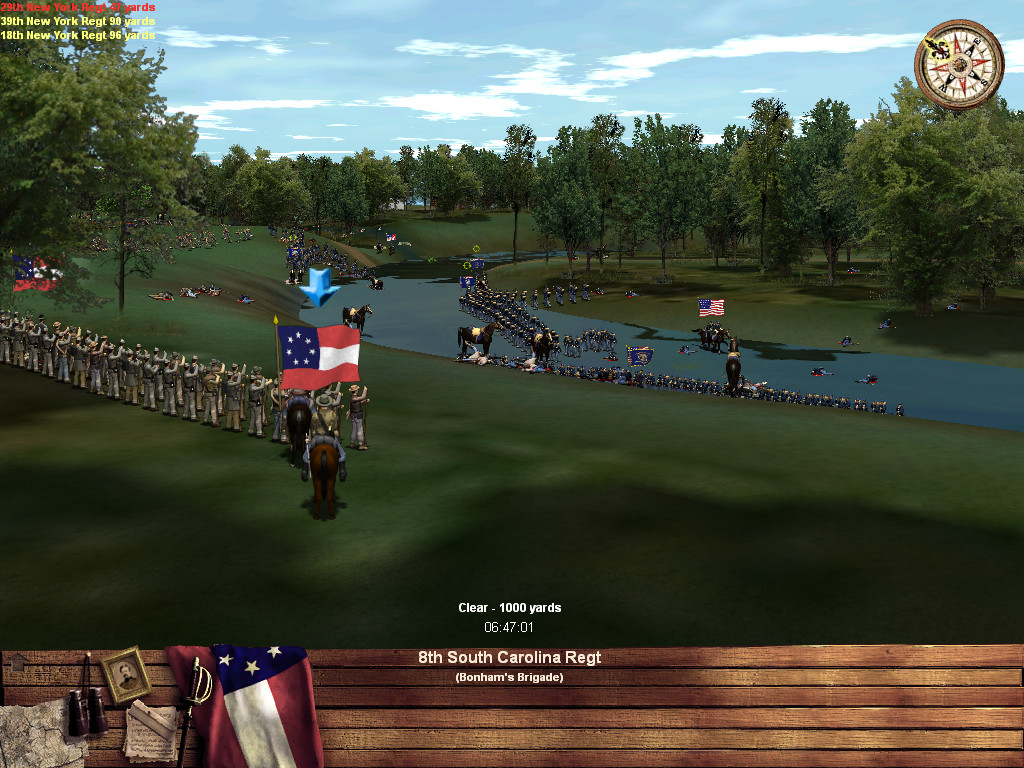
There sure were a lot of Yankees over here on this side of the battle. Caught in a bad spot, fortunately for us, but disturbing. Fighting them on even ground wouldn’t be something to wish for.
There were so many regiments nearby, in fact, that some were being pushed around our knoll to the south, still in the river. 2nd TN was having to rotate on a hard angle to keep them under fire, and was doing well, but Lord the TN Vols were spitting through their ammunition! Much faster than 1st AR, and
they had more targets to work on!
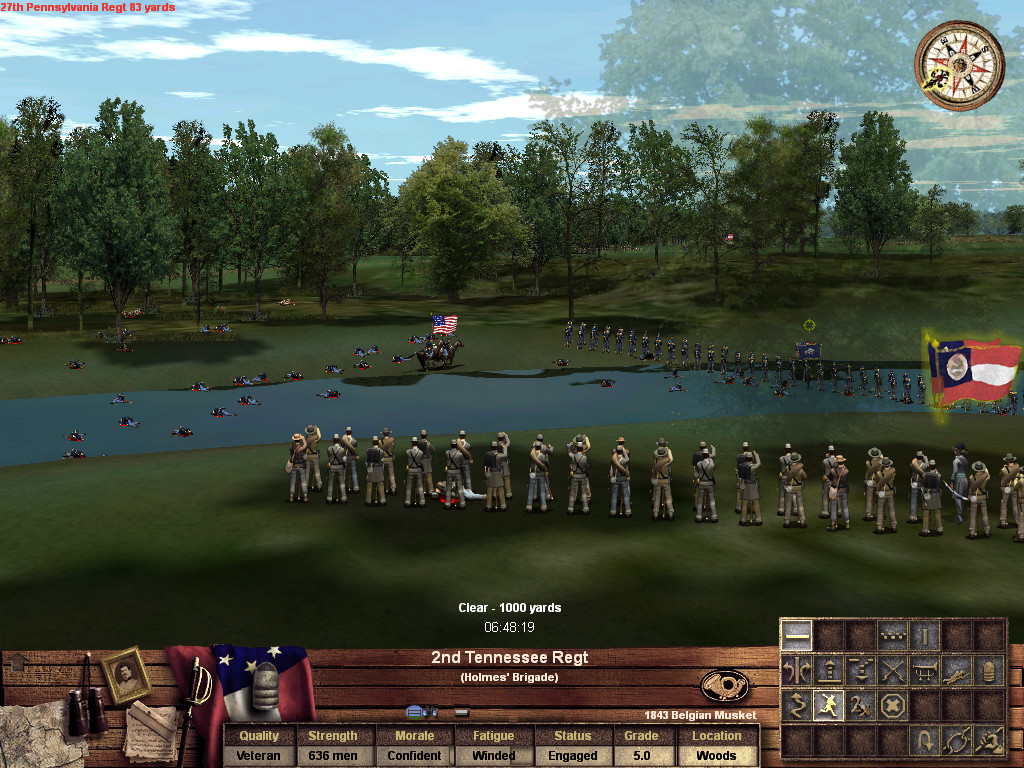
Despite our crushing victory, I felt increasingly uneasy. Sure, plenty of Union brigades were simply giving up and running away. But they weren’t running north, back home.
They were running south.
And despite the pounding, plenty of Union troops seemed to be haunting the area nearby across the river. And if the flow of troops seemed right, more were coming in from the north on
our side of the river, too.
Indeed, on my next trip over to check on 1st Arkansas, they were wheeling to shoot at a New York regiment (how many regiments had New York sent?!) which... good grief, it was standing where Bonham’s division was supposed to be! How had that happened!?
And more blueheads coming up behind them.
“Time to go!” I ordered Colonel Drake. “You get our boys back into the woods, disengage as soon as you can! Double-time-it once you start, but fall back in order!”
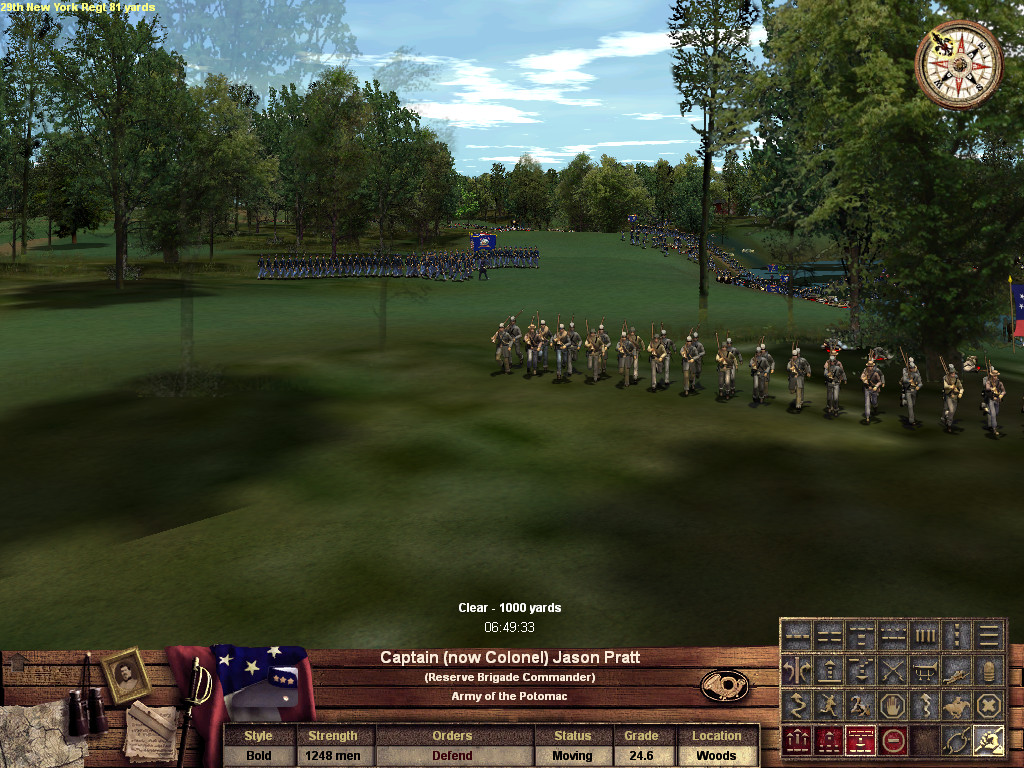
Soon Arkansas was standing deep in the wooded knoll, back to back with their Tennessee volunteer brothers, who were taking a breather after driving away a regiment from Pennsylvania.
“Gentlemen,” I said, not too loudly as I didn’t want the Yanks to get a good idea where we were, “this has been a God-Almighty defense! Let’s not turn it into catastrophe. We haven’t gotten new orders, but our allies have gone, and all I see around us are Yankees. Let’s rest up a bit, if we can, and then we’ll start -- “
We started shooting at a Union regiment advancing along the riverbank, outside the woods. They quickly broke and ran. But stronger regiments were coming up.
“Might’ve waited a bit too late, Colonel,” said Captain Gore.
“Or a bit too early,” grumbled Drake. “These Yanks need to be slapped on the nose a few more times, so that they’ll leave us be!”
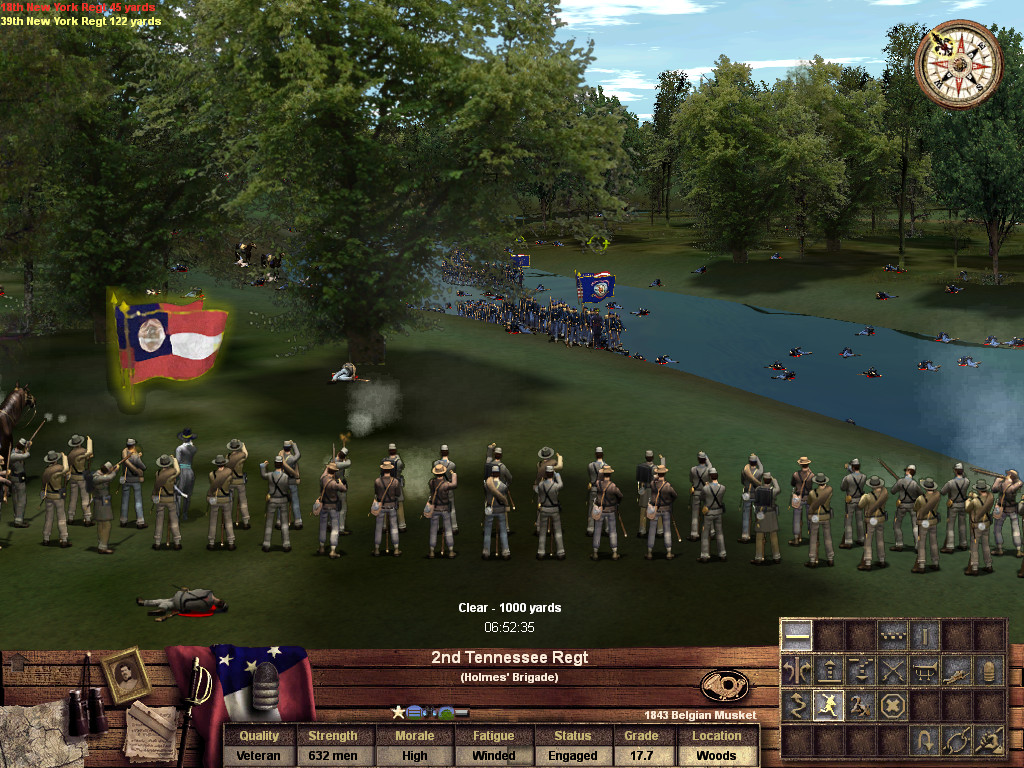
The Arkansas Volunteers got to slapping.
Tennessee, although dangerously winded, soon joined the fray, even advancing up farther a few minutes later to hassle some depleted Union regiments stuck in the river -- having effectively traded places with the Arkansians.
Although we didn’t know it, we had broken the back of the advancing Union reinforcements -- not without a lot of help from Bonham’s men of course. But later we heard them talking about the two regiments of Volunteers who had whipped two Union divisions!
Yet as the final Union regiments were being dispersed, down in the river for their baptism of war, I couldn’t help but continue to worry. Sure, it didn’t seem like we had too many things to worry about nearby.
But we now had a ton of scattered Union troops who had routed
into our own rear!That, I opined to my men, as the Vols took a well-deserved rest, seemed a recipe for disaster.
So far as we could gather from polling my various officers and sergeants, this was what we could see.

“We’ve got scattered allied brigades meandering around, apparently out of command, but they won’t join us -- sorry, Colonel, you just don’t rank enough,” grumbled Captain Gore.
“And more scattered Yanks. Including a divisional headquarters across the river somewhere in those trees,” said Captain Boyle. “The only regiment we can actually see is those Pencils your Tennessee boys were shooting down in the river for a while. They’re stupidly restin’ down there, rather than climbin’ the banks and into the trees!”
[Gamenote: I can’t begin to explain that in-story. But it’s potentially important, so I figured I’d better mention it.]
“Most importantly,” said Drake, “we don’t know for sure how many other Yankee regiments are around here. But we do know there’s a lot of artillery.”
“Which,” said Grubb, “I’d shore like t’ march around an’ take if we could! You boys don’t have much ammo left, and they prob’ly got a supply wagon up there somewhere.”
“I can see three plans here,” I said. “Go forward, stay here, go back.”
“That’s about it,” Boyle drawled.
“Okay, option one: go forward. That means we find a way to circle around the artillery, capture them from behind, if we can, and then go on to Centerville. It’d be a hell of a coup, for sure, pardon my Biblical Greek,” I grinned, and got some laughs. “But,” I started ticking off points with my fingers, “we don’t know how many Union regiments are really in the area; we don’t know how dangerous they are; we do know that artillery is dangerous, and these have snipers for spotters apparently; if they shotgun us coming out of the woods, well, remember what Captain Walker was training his crew to do this morning!” That got some real grimaces. “We don’t really know for sure if there’s any ammunition wagons; we don’t know what’s between the artillery and Centerville; we don’t know what we might have to fight at Centerville; we don’t know how long it might take us to resupply at Centerville while we secure it; and we don’t know how many Yankees we might be fighting afterward until our Allies catch up with us. If ever.
“And we might be letting ourselves in for a serious problem south of us, which gets us to option 2: go back.
“The point here is that we know a ton of Yanks are running around behind our lines. Scattered they aren’t a threat, but if a ranking officer or two can get them rallied, they might march on to Manassas and that would be a disaster, even if we’ve taken Centerville meanwhile. We’re in a position we can go defend one road at least, and maybe send back to Manassas for resupply. We know we wouldn’t be facing many problems yet if we go now, and it might help win the battle as much as punching on to Centerville, even assuming we manage to knock out those cannons along the way. It ain’t glamorous, and it ain’t daring, but I have to say it seems the smartest play: the best results for the most of our men returning home alive.”
Not many of us had died yet. Or even been hurt. But some had. And some were outright missing. Which was worse.
“Option three? Stay here. We’ve clearly got a good position, and it isn’t one the cannons seem able to hassle. But the enemy also knows where we are.”
“It’s a trap, sir, there’s TWO regiments in there!” twanged Colonel Gore with a Yankee accent, to widespread laughter.
“Uh, well, that’s funny until they surround our leafy fortress here -- which, by the way, they’re already doing! -- and we can’t get out, and five minutes later the 2nd Tenn runs out of ammo. Being able to maneuver,” I said, “might be a lot better defense. But it’s a legitimate option to consider. And also the only legal option, because we have orders to defend this area, and no one has gotten new orders to us yet. We’re allowed to retreat if we’re pressed, but that’s it. So if we go forward or back, well, y’all won’t be in trouble, but
I might be. Except we’ll all be in a bagful of trouble if we go forward, for sure. And we might all be in a bagful of trouble if we stay.
“Going back, I’m almost certain to be the only one in trouble for doing that. So don’t think for a minute this is about cowardice. Going back is a legitimate operational goal, that someone needs to do, and we might be the only ones who can do it -- although that’s true about taking Centerville, too -- but if we fail to impress the generals that we did the right thing,
I’m the one who gets in trouble either way, whereas you-all will be in a lot less trouble personally, I guess, if we go back.
“So,” I finished as we rested in the woods. “What do we do? I’m the commanding officer, but it’s your lives on the line, moreso than mine. We have a responsibility to protect the people of Virginia, and we have a responsibility to get as many of us as we can back home to our families, and we have a responsibility to stop this war as soon as we can. I don’t honestly know that we can hold Centerville, or even take it, or even get there past those cannons. But:
if we could, and
if our friends can get there, too...
“Washington, the Federal capital, is less than twenty miles away.
“We might not even have to get there, much less fight. Simply marching on that road might be enough for them to promise to disband their troops, and not split our nation up with their bayonets.
“We could
all go back home.”
Not even seven o’clock in the morning quite yet. And we might be deciding the fate of the war, and of our nation, right here.











 Similar topics (5)
Similar topics (5)